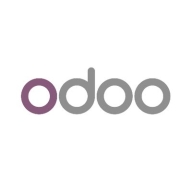

SAP Business One and Odoo compete in the ERP category, offering comprehensive solutions for businesses. Odoo seems to have the upper hand due to its cost-effectiveness and flexibility, which appeal more to small and medium enterprises.
Features: SAP Business One is recognized for its financial management capabilities, multi-currency support, and efficient document management facilitated by features like the Yellow Arrow. Odoo is appreciated for its open-source flexibility, a wide array of customizable modules, and cost-effectiveness, particularly for SMEs.
Room for Improvement: SAP Business One could improve its Production and Bill of Materials functionalities, reporting tools, and third-party integrations. Enhancements in HR and payroll modules would also be beneficial. Odoo could enhance its dashboard, reporting, and performance in large deployments, along with improving workflow design and automation tools.
Ease of Deployment and Customer Service: SAP Business One offers flexible deployment models including On-premises and Cloud, with service quality varying by partner. It generally provides good support through a partner network. Odoo provides flexible deployment options as well, with satisfaction in technical support due to active open-source community involvement.
Pricing and ROI: SAP Business One's pricing through perpetual and subscription-based licenses is seen as reasonable but inflexible. It achieves early ROI through process improvements. Odoo offers competitive pricing with a straightforward subscription model, delivering cost efficiency and appealing to budget-conscious businesses with its low operational costs.
Currently, I manage those tasks independently, which is a significant cost-saving measure for my small business.
There are instances of significant cost saving by improving processes and obtaining necessary data for better analysis.
Technical support from Odoo is available and eager to help.
The previous user left the company without sharing their password, so at that time I need to log those particular issues or reset the password; the facility is not available in the current system, and I have to raise tickets, waiting for updated passwords, which is very critical.
When the system or solution has a failure unrelated to the database, they become lost.
Through the SAP portal, we can access direct support, which includes notes and a massive community for resources.
I rate the scalability of Odoo as eight to nine out of ten.
SAP Business One is not very scalable, as it is aimed at medium to small-scale industries.
If your company is looking for an ERP to run end-to-end business, this is the solution.
The scalability of SAP Business One is very high.
Stability is very important because any software that supports your business must be available consistently.
We can maintain our clients with the latest delivery version stable; it is a stronger product and ERP that improves with each version.
SAP Business One is a very stable solution, and I rate its stability as ten out of ten.
I rate the stability of SAP Business One an eight out of ten.
Odoo's documentation needs improvement, as there are areas that are not well-documented.
The solution lacks scalability as it targets medium to small-scale industries.
They also need to plan for integrating a small HR or payroll module.
Costing audits are required, but this is not available in SAP Business One.
The pricing for Odoo is affordable, with the solution being significantly cheaper than its competitors like SAP, Microsoft, and Oracle.
It is expensive compared to other modules or ERPs.
The pricing of SAP Business One is fair.
All modules in Odoo are integrated together, providing seamless transitions across various functionalities.
This feature allows me to get all the necessary data required to best analyze the business and improve processes.
The general ledger, balance sheet, trial balance, cash flow statement, and all other reports are updated simultaneously.
Regarding reporting capabilities, SAP Business One provides in-built reports and allows us to use crystal reports, which we can customize and develop our own reports alongside running SQL queries with the query generator to create SQL reports.
| Product | Market Share (%) |
|---|---|
| SAP Business One | 3.2% |
| Odoo | 3.3% |
| Other | 93.5% |


| Company Size | Count |
|---|---|
| Small Business | 28 |
| Midsize Enterprise | 5 |
| Company Size | Count |
|---|---|
| Small Business | 45 |
| Midsize Enterprise | 30 |
| Large Enterprise | 24 |
Odoo is a suite of open source business apps that cover all your company needs: CRM, eCommerce, accounting, inventory, point of sale, project management, etc. Odoo's unique value proposition is to be at the same time very easy to use and fully integrated.
SAP Business One offers a comprehensive toolset catering to the needs of small to medium enterprises, focusing on finance, sales, inventory, and manufacturing processes. Its features include real-time data processing, customization, and scalability, ensuring efficient business operations.
SAP Business One is a versatile ERP solution designed to support small to medium businesses across different industries. It streamlines operations through effective integration of sales, purchasing, inventory, and financial processes. Cloud accessibility enhances flexibility, while multi-currency handling and document management improve operational efficiency. Despite an outdated interface and limited HR capabilities, its user-friendly design and localization are highly beneficial. Users appreciate the real-time data processing capabilities and seamless operations across various modules, along with its adaptability to diverse business requirements.
What are the crucial features of SAP Business One?In manufacturing, SAP Business One optimizes production management and resource planning, improving efficiency and reducing downtime. Retail businesses benefit from its inventory and sales integration, ensuring accurate stock management and enhanced sales processes. Service industries leverage its automation and reporting capabilities for better client management and service delivery.
We monitor all ERP reviews to prevent fraudulent reviews and keep review quality high. We do not post reviews by company employees or direct competitors. We validate each review for authenticity via cross-reference with LinkedIn, and personal follow-up with the reviewer when necessary.